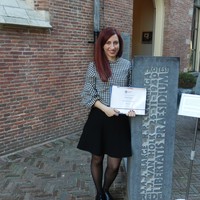- Leiden University, Classics, Alumnusadd
In this essay I explore the presentation of Heracles in the Iliad, Odyssey, and Theogony, the only complete, archaic epics unrelated to Heracles that occasionally engage with the hero. I examine whether thematic manipulation is due to... more
In this essay I explore the presentation of Heracles in the Iliad, Odyssey, and Theogony, the only complete, archaic epics unrelated to Heracles that occasionally engage with the hero. I examine whether thematic manipulation is due to contextual parameters, mythical variants, or distinct aims by the relevant poets. As will be shown, Heracles’s attributes are redeployed to fit into each context. All, however, derive from a common set of themes, collectively comprising the hero’s epic ID.
Research Interests:
This article focuses on Statius’ representation of Thetis in the Achilleid in comparison with her representation in the Iliad. Statius, it is argued, goes against the Homeric tradition, depicting the goddess with features opposite from... more
This article focuses on Statius’ representation of Thetis in the Achilleid in comparison with her representation in the Iliad. Statius, it is argued, goes against the Homeric tradition, depicting the goddess with features opposite from those she possesses in Homer. Thetis, generally perceived as a modest and ladylike speaker in the Iliad, employs masculine-gendered rhetoric and becomes offensive in the Achilleid; paternal acts linked to Peleus in the Homeric tradition are in Statius’ poem undertaken by Thetis; Homer’s omniscient and powerful goddess is almost ridiculed in Statius: being obsessed with the impossible, i.e. Achilles’ salvation, she repeatedly fails to achieve a possible delay of his doom. Through this technique, Statius inverts Thetis’ traditional character, creating a heroine that fits perfectly in his unconventional epic of cross-dressing and role-play.
Research Interests:
This article reexamines Patroclus’s famous comment on Achilles’s cruelty in which the sea and the rocks take up the role of the latter’s parents (Iliad 16.33–35). The verses reflect Near Eastern myths about the birth of menacing creatures... more
This article reexamines Patroclus’s famous comment on Achilles’s cruelty in which the sea and the rocks take up the role of the latter’s parents (Iliad 16.33–35). The verses reflect Near Eastern myths about the birth of menacing creatures from the sea and the rocks and are particularly associated with the Song of Hedammu and the Song of Ullikummi of the Hurro-Hittite tradition. Thematic, mythological, and dictional parallels among these texts are discussed in order to explore the existence of a common theme with specific connotations in the broader region of West Asia.
